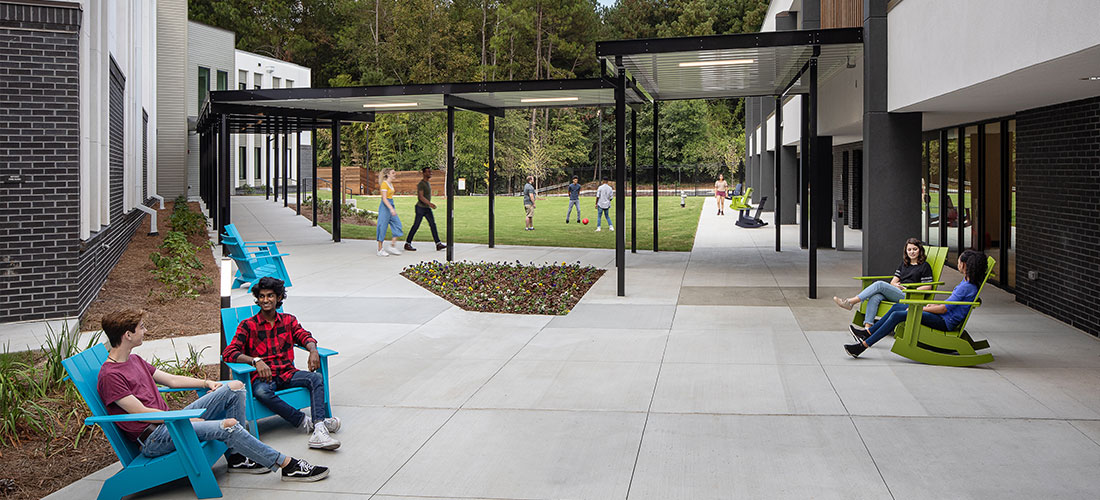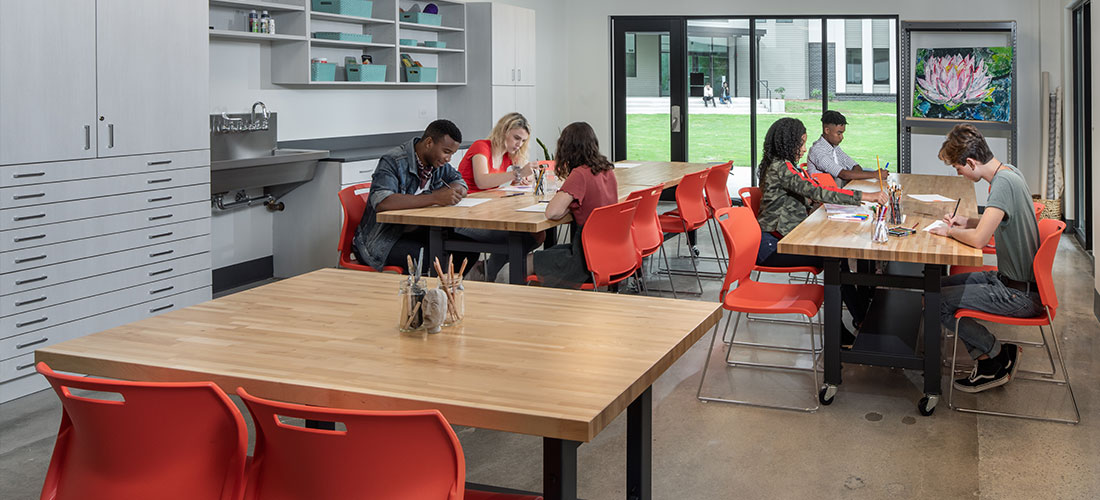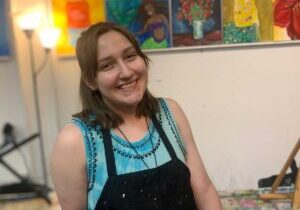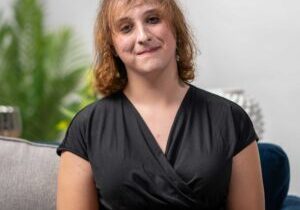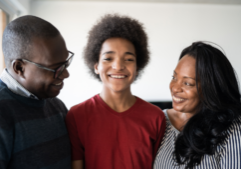Residential Mental Health Treatment Program for Adolescents Ages 14 to 17
Adolescent clients who admit to the residential treatment program for teens typically stay at the residential level of care for about 12 weeks.
Our longer length of stay gives our treatment team more time to get to know each teen and tailor treatment to their individual needs. The 12-week treatment program also gives our clients the time and space to learn, practice, and adopt skills that will help them change unhealthy behavior patterns and engage more positively with their families, schools, and communities. Total treatment costs depend on the level of care required and the number of days needed to complete treatment.
The adolescent residential program includes:
Our adolescent residential treatment program provides individualized, evidence-based treatment by diagnosis. Clients meet with a dedicated therapist one-on-one at least twice each week. Clients meet individually with a psychiatric provider at least once each week.
Residential and day treatment adolescent clients participate in psychological testing with our psychological services team. Psychological testing typically takes place over multiple sessions for a total of about 8 to 10 hours. Some assessments will include feedback from parents and guardians.
Adolescents complete several tests, including self-report questionnaires, computerized tasks, and some interactive components. Results of psychological testing are used to clarify a client’s diagnoses and to help match the teen with the most appropriate evidence-based treatment (e.g., medication, goals for individual sessions, academic skills coaching, etc.).
Standard psychological tests may uncover learning, behavioral, emotional, psychiatric, or cognitive challenges as well as identify strengths that a teen may apply to achieving their goals. Results may be used after treatment at Skyland Trail to guide continued mental health treatment in the community or to request specialized services or accommodations from schools or other programs.
Family programming and involvement is an important part of the teen residential mental health treatment program.
Families are required to participate in family therapy sessions at least once each week. While each client meets individually with their primary therapist at least twice each week, sessions with the family therapist focus on the family system and require introspection and adjustments from all family members, not just the adolescent.
Families also are required to participate in the weekly Adolescent Family Program. The Adolescent Family Program includes education on mental health topics, strategies for how to reinforce skills at home, and peer support.
All family activities are conducted remotely via zoom.
Adolescent clients enrolled in residential treatment receive an educational needs assessment at admission and academic education services year-round. Daily schedules include at least two and a half (2.5) hours of structured academic support each weekday. If clients have struggled with school in the past, the education specialist helps them work toward building skills to handle classroom dynamics, assignments, and presentations in a supportive environment.
Residential adolescent clients are required to be enrolled in an accredited school or online learning program while enrolled in treatment. Skyland Trail is committed to working closely with a client’s current school of enrollment when possible; however, we ask that schools agree to a few partnership requirements.
If the client does not want to remain enrolled at their current school, or if the current school is unable to meet the partnership requirements, the client will be enrolled in ADVANTAGES Digital Learning Solutions.
Skyland Trail is a holistic mental health treatment program for teens. Experiential activities offered throughout each week include art, music, fitness and sports, yoga, meditation, and horticultural therapy. Experiential activities give adolescents a break from talk therapy, encourage social engagement with peers, and help teens explore activities that they can use to express emotions and maintain mental health long-term.
Experiential activities also employ Behavioral Activation, an evidence-based therapeutic approach. Many teens with depression or anxiety have developed avoidance as an unhealthy coping strategy. Behavioral activation helps break the cycle of avoidance and reinforces the connection between doing things and feeling good.
School-Like Campus
The J. Rex Fuqua Campus is a welcoming environment that fosters engagement in treatment and a sense of community. Clients receive private bedrooms and bathrooms.
Specialized Psychiatric Care
Each client is assigned to one of two diagnosis-specific core groups: CBT Skills or DBT Skills. Clients meet with their core group each day, Monday through Friday. Specialized track assignment also informs the therapeutic approach for individual and family therapy work.
DBT stands for Dialectical Behavior Therapy. The DBT residential program for teens helps clients who struggle with emotion regulation, anger outbursts, fear of abandonment, or self-harming behaviors learn how to tolerate uncomfortable situations, ask for help or support in healthy ways, and acknowledge emotions without allowing them to drive behaviors.
Our intensively trained DBT treatment team meets weekly to discuss complex client cases and to develop comprehensive strategies to help clients progress. Across the organization, our multidisciplinary treatment team, including residential staff members, receive ongoing training on how to support DBT clients. We adhere to the DBT model created by Dr. Marsha Linehan and Behavioral Tech, with some adaptions for adolescent residential program delivery. As part of the DBT model, residential counselors provide 24/7 in-person DBT skill support, and clients have access to after hours DBT phone coaching 24/7 from clinical on-call staff.
CBT stands for Cognitive Behavioral Therapy. The CBT residential program for teens helps clients who struggle with perfectionism, low self esteem, fear of failure, or social anxiety learn how to manage stress, balance their own needs with the expectations of others, and confront and reframe recurring negative thought patterns.
Prolonged Exposure Therapy (PE) may be recommended for some teen clients with PTSD. PE is an individual therapy.
Prolonged exposure therapy may be particularly helpful for clients who have trauma-related symptoms that prevent them from fully engaging in foundational CBT or DBT therapeutic work.
The goal of PE as part of residential treatment for teens with trauma is to reduce the power of the memory of the traumatic event over time. With less potency, the memory becomes less disruptive, and the patient is better able to engage more fully in treatment to address other psychiatric symptoms and improve coping and interpersonal skills.
Dual Diagnosis groups help clients with a history of mild to moderate substance use examine their relationship with alcohol, marijuana and other substances. Clients receive education on how use may intersect with their mental health symptoms or interact with their medications. And clients examine motivations for substance use and opportunities to adopt new skills and strategies to cope with difficult situations or emotions.
In addition to their CBT or DBT track, all clients also participate in groups throughout the week based on the Ecological Systems Theory therapeutic approach. This evidence-based approach helps clients examine their own unique identity and values as well as how they are impacted by and can influence the people, systems, and environment around them.
Clients are given tools and support to explore questions about their gender, sexual, and cultural identity; peer and family relationships; attitudes and behaviors related to alcohol and substance use; and their concerns about their role in larger issues such as climate change or social justice.
Structured Daily Schedule
Adolescents in our teen residential program participate in a structured daily schedule that includes yoga & meditation, academic instruction and support, fitness and wellness activities, and individual and group therapy sessions. Groups include evidence-based therapeutic groups, peer support groups, family therapy, and experiential therapy.
Adolescent clients meet with their dedicated therapist one-on-one at least twice each week. Clients meet individually with their psychiatrist at least once each week.
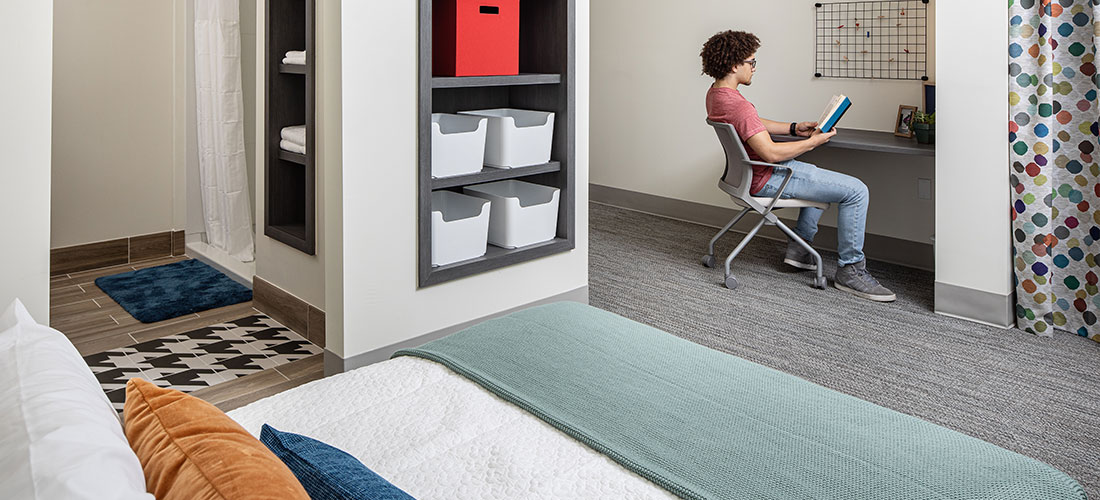
Reset to Healthy Living
On evenings and weekends, our residential staff help clients work on re-establishing healthy sleep and meal schedules, self care and hygiene, medication adherence if applicable, and healthy social and recreational activities. Our skilled and caring residential staff ensure that our clients are supported, engaged in the Skyland Trail community, and working toward healthy living habits.
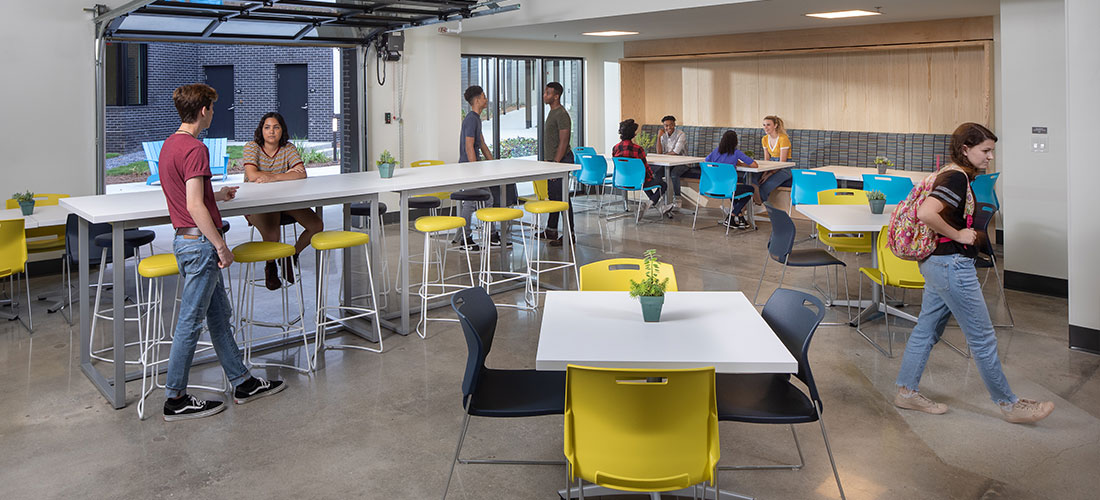
Adolescent Campus Life
Our adolescent clients enjoyed minute-to-win-it games, an inflatable obstacle course, treats, music, bubbles, and more at our 4th Annual Fall Fest on October 18! #campuslifeadolescent

Our adolescent clients enjoyed minute-to-win-it games, an inflatable obstacle course, treats, music, bubbles, and more at our 4th Annual Fall Fest on October 18! #campuslifeadolescent
“Your cracks don’t define you!” Adolescent clients recently worked with our horticultural therapist to create “eggheads.” Clients were encouraged to style their eggheads to represent how they see themselves. Therapeutic discussions centered on how our “cracks” make us unique. #campuslifeadolescent

“Your cracks don’t define you!” Adolescent clients recently worked with our horticultural therapist to create “eggheads.” Clients were encouraged to style their eggheads to represent how they see themselves. Therapeutic discussions centered on how our “cracks” make us unique. #campuslifeadolescent
Check out these fun spring murals created by adolescents at our J. Rex Fuqua Campus! #campuslifeadolescent

Check out these fun spring murals created by adolescents at our J. Rex Fuqua Campus! #campuslifeadolescent
Hallway art from our J. Rex Fuqua Campus for adolescents: "Fall shows us how beautiful it is to let things go" #campuslifeadolescent

Hallway art from our J. Rex Fuqua Campus for adolescents: "Fall shows us how beautiful it is to let things go" #campuslifeadolescent
Check out this incredible mural created by a client at the J. Rex Fuqua Campus for adolescents ages 14 to 17. #campuslifeadolescent

Check out this incredible mural created by a client at the J. Rex Fuqua Campus for adolescents ages 14 to 17. #campuslifeadolescent
Clients at the J. Rex Fuqua Campus for adolescents ages 14 to 17 use art to remind themselves and others to keep fighting for the life they want while in treatment. #campuslifeadolescent

Clients at the J. Rex Fuqua Campus for adolescents ages 14 to 17 use art to remind themselves and others to keep fighting for the life they want while in treatment. #campuslifeadolescent
As part of a back-to-school event adolescent clients released biodegradable balloons, symbolically letting go of words like fear, perfectionism, and not enough.
Clients in the adolescent program receive at least 3 hours of academic support each weekday. They continue to make progress toward graduation while in treatment.
To learn more about our mental health programs for teens ages 14 to 17, visit the link in our bio for this post or skylandtrail.org/adolescents
#SkylandTrail #OfferingHope #ChangingLives #MentalHealth #TeenMentalHealth #campuslifeadolescent

As part of a back-to-school event adolescent clients released biodegradable balloons, symbolically letting go of words like fear, perfectionism, and not enough.
Clients in the adolescent program receive at least 3 hours of academic support each weekday. They continue to make progress toward graduation while in treatment.
To learn more about our mental health programs for teens ages 14 to 17, visit the link in our bio for this post or skylandtrail.org/adolescents
#SkylandTrail #OfferingHope #ChangingLives #MentalHealth #TeenMentalHealth #campuslifeadolescent
We celebrated #Pride Month at the J. Rex Fuqua Campus for adolescents with symbols of support and inclusion around campus, activities, and… llamas! 🌈 #campuslifeadolescent

We celebrated #Pride Month at the J. Rex Fuqua Campus for adolescents with symbols of support and inclusion around campus, activities, and… llamas! 🌈 #campuslifeadolescent
Last week, Skyland Trail staff at our adult and adolescent campuses participated in spirit week to spread a little joy during the holiday season. Staff were encouraged to take part in themed days for their favorite sports team, Disney characters, a day of wacky socks and hair, superhero day, and decades day. #campuslifeadolescent

Last week, Skyland Trail staff at our adult and adolescent campuses participated in spirit week to spread a little joy during the holiday season. Staff were encouraged to take part in themed days for their favorite sports team, Disney characters, a day of wacky socks and hair, superhero day, and decades day. #campuslifeadolescent
@witsendllamas recently visited adolescent clients at the J. Rex Fuqua Campus. Clients enjoyed petting the llamas` soft fur and leading them around the courtyard.
Did you know that one of the ways llamas communicate is by humming?
#llamas #RecreationalTherapy #RecTherapy #MentalHealth #SkylandTrail #OfferingHope #changinglives #campuslifeadolescent

@witsendllamas recently visited adolescent clients at the J. Rex Fuqua Campus. Clients enjoyed petting the llamas` soft fur and leading them around the courtyard.
Did you know that one of the ways llamas communicate is by humming?
#llamas #RecreationalTherapy #RecTherapy #MentalHealth #SkylandTrail #OfferingHope #changinglives #campuslifeadolescent
Clients and staff at the J. Rex Fuqua Campus for adolescents enjoyed Field Day this week! #campuslifeadolescent

Clients and staff at the J. Rex Fuqua Campus for adolescents enjoyed Field Day this week! #campuslifeadolescent
For Black History Month in February, adolescent clients created posters with information on influential and historical black leaders in music, social justice, the armed forces, and sports. #campuslifeadolescent

For Black History Month in February, adolescent clients created posters with information on influential and historical black leaders in music, social justice, the armed forces, and sports. #campuslifeadolescent
Clients in our adolescent residential treatment program have created some eye-popping 👀 Fescue Rescue Pets—our DIY spin on the famous @chiapetofficial. Made with soil and shade-loving fescue seeds as part of the adolescent horticultural therapy program, these little critters grow so fast!
And now we have the Ch-Ch-Ch-Chia Pet jingle stuck in our head 🎵 🤪
#campuslifeadolescent #Horticulture #HorticulturalTherapy #MentalHealth #GrowThroughWhatYouGoThrough #FescueRescuePets #Fescue #ChiaPets

Clients in our adolescent residential treatment program have created some eye-popping 👀 Fescue Rescue Pets—our DIY spin on the famous @chiapetofficial. Made with soil and shade-loving fescue seeds as part of the adolescent horticultural therapy program, these little critters grow so fast!
And now we have the Ch-Ch-Ch-Chia Pet jingle stuck in our head 🎵 🤪
#campuslifeadolescent #Horticulture #HorticulturalTherapy #MentalHealth #GrowThroughWhatYouGoThrough #FescueRescuePets #Fescue #ChiaPets
Next Steps After Residential Treatment
Depending on the client's progress in residential treatment, after the teen completes the 12-week residential program, the treatment team may recommend that client step down to the adolescent day treatment program. Clients in day treatment live with their families at home and come to campus Monday-Friday 9:00 to 3:00 to continue to practice skills and grow.
Adolescent Residential Program Fees
The adolescent residential treatment program is in-network with most major private insurance providers. Skyland Trail treatment programs are not in-network with Medicare or Medicaid. Most families use a combination of private insurance, private pay, and financial aid awards (if eligible) to cover total treatment costs. Learn more about adolescent residential treatment program fees.
Adolescent Residential Frequently Asked Questions
Medication may be recommended after a complete psychiatric assessment as part of a comprehensive treatment plan. Some patients will not require medications due to their diagnosis and work in other areas of treatment; however, some patients with certain diagnoses or needs that require psychiatric medication adherence will need to be open to taking their medications in order to stay in our program. If medication is recommended, the psychiatrist will discuss risks/benefits of medications and alternative treatments as part of the informed consent process.
Yes. To protect the health of our clients and staff, all adolescents must provide a current record of immunizations prior to admission. The record should show dates for all vaccines on the CDC's Recommended Child and Adolescent Immunization Schedule for ages 18 years or younger and be signed by a licensed physician or public health official.
Unless medically contraindicated, adolescent clients in services during flu season must also have the CDC-approved annual seasonal influenza vaccine.
Skyland Trail’s goal is to foster a space of safety and support that encourages exploration and growth for the adolescent and their family, while promoting psychological and emotional resiliency. Several aspects of the Adolescent Treatment Program make Skyland Trail an effective, inclusive and welcoming environment for trans teens; gender non-binary or gender fluid teens; lesbian, gay, or bisexual teens; and other LGBTQ+ adolescents and their families. The Adolescent Program staff utilizes LGBTQ+ affirming therapeutic practices to support the teen through all phases of developmentally appropriate exploration and/or questioning of gender identity, gender expression, and/or sexual orientation. Our focus is to provide the adolescent and family with therapeutic treatment that supports healthy development, builds a secure self-identity and fosters resiliency to enhance their quality of life and strengthen the family bond.
While we affirm the identity of our adolescent patients by using clients' preferred (i.e. correct) names and pronouns, due to Georgia state law, we are unable to prescribe or administer hormone therapies for clients under the age of 18 unless initiated prior to July 1, 2023. Our adolescent residential hall offers private patient rooms with private bathrooms and is not separated by gender. All our facilities include all gender restrooms.
The Skyland Trail adolescent residential treatment program is device free. Clients may not have mobile phones, smart phones, tablets, laptops or other devices anywhere on campus.
This depends on the school in which the teen is enrolled. In order for the client to remain enrolled in their current school, the school must complete a Partner School Agreement and adhere to a set of requirements.
No. Adolescent clients will need to take break from sports, music or other extracurricular activities while in treatment. As part of their treatment, teen clients participate in recreational sports, fitness and outdoor activities on campus during their stay with us. They also engage in a myriad of experiential therapies of their choice including art, music, creative movement, psychodrama, yoga, meditation, horticulture.
Only family and extended family members may visit. A legal guardian must be present for each visit appointment. Visitors must be at least 12-years-old. Client friends, peers, and significant others may not visit.
Adolescent residential clients may not leave campus or receive off-campus passes. Skyland Trail will accompany the adolescent to medical appointments in the community as needed.
Clients may not receive phone calls, emails, texts, or social DMs from friends or peers while in treatment.
Clients may call with guardians and approved family members once each week and facetime/skype with guardians and approved family members once each week. Clients also interact with guardians during family therapy at least once each week (offered in-person or via zoom).
Friends and family may mail letters or pre-approved packages to clients. Letters and packages will be opened in front of Skyland Trail staff and may not contain any prohibited items.
Family members may visit once each weekend. Please see rules for visiting.
Smoking and vaping are illegal for individuals under the age of 18 in Georgia. All Skyland Trail campuses are 100% nicotine free. No smoking, vaping, or tobacco use is permitted anywhere on our campuses. Adolescents with a history of nicotine use may consult with their psychiatrists on appropriate nicotine cessation strategies.
Once you have an admission appointment scheduled, learn more about what to pack and what to leave at home. Please also review the dress code:
https://www.skylandtrail.org/admissions/preparing-to-admit/what-to-bring-adolescent/
When categorizing mental health treatment facilities, "inpatient" usually refers to a hospital or locked acute care facility.
Skyland Trail is not a hospital. Teens in our program may not leave campus. But different than a hospital, adolescent residential clients have private patient rooms and enjoy an engaging daily schedule of group and individual activities that take place on a school-like campus.
Some people describe their experience in a residential treatment program as a stay in an inpatient teen mental health program because of the longer length of stay and the 24/7 care and support they receive.
The goals of a stay in the hospital or a traditional inpatient teen mental health facility would be to stabilize after a crisis. The goals of treatment in our teen residential mental health center are to help adolescents feel better and learn skills to return home to their families to successfully manage their mental health long-term.

